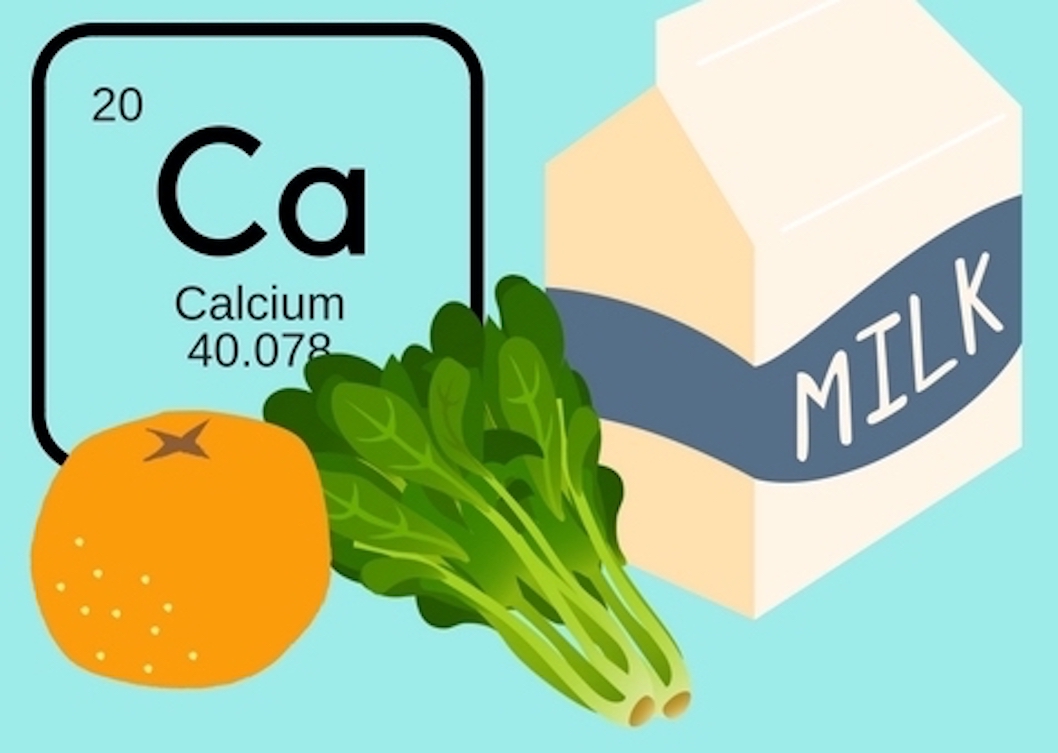Calcium Sources

Calcium is one of the most important nutrients for developing and maintaining bone health. The symptoms of calcium deficiency may not be apparent immediately; however, monitoring calcium intake is important not for maintaining current health, but also for future health. Calcium deficiency is a problem that affects many when they are older, especially women, so it is important to be getting enough calcium in your diet while you are still young.
Dairy products are the most obvious source of calcium. But if you’re lactose intolerant, vegan, or otherwise not too keen on dairy, you can also get your daily dose of calcium from different dark green leafy veggies. However, the highest percentage of calcium absorption is from dairy products (30%) while green leafy vegetables result in only about 5% calcium absorption (Mayo). People who do not like or cannot tolerate dairy products can also turn to calcium fortified products. One of the best substitutes for milk is fortified soy milk, which gives just as much calcium as traditional cow’s milk, and is also a good source of Vitamin D, which is necessary for calcium absorption (Harvard). While calcium-fortified foods have many benefits, it is important to note that they are more like supplements than natural sources of calcium found in food. More importantly, not all calcium-fortified foods are made equally. The form of calcium used, as well as the other substances in the food, can drastically change how well the body is able to absorb and use the calcium. For example, high levels of protein and sodium increase calcium excretion through the kidneys; excessive amounts of those ingredients should be avoided to maximize calcium levels (NIH).
If you are unable to get enough calcium through food, calcium supplements may be an option. Common candidates include those who follow a vegan diet, have osteoporosis, are lactose intolerant, or have certain bowel or digestive disorders that prevent calcium absorption. You should only take enough to supplement the calcium you already ingest through your diet. Calcium is best absorbed in doses of 500 mg or less, and often works best when taken with food. (Harvard). The two most common forms of calcium found in supplements are calcium citrate and calcium carbonate. Their differences make them the right choice for different groups of people. Calcium carbonate is inexpensive and found in most over the counter supplements such as Tums (Upton). Calcium carbonate is 40% elemental calcium while calcium citrate is only 21% elemental carbon. Elemental calcium is the true amount of calcium in the supplement that the body can use for bone growth. So a 1,250 mg Calcium Carbonate tablet contains 500 mg elemental calcium. Calcium citrate is easier for the body to absorb on an empty stomach (Mayo). This is the better option for elderly individuals or patients with bowel disease, who tend to have less stomach acid to absorb the calcium. However, this option is often more expensive (Upton).
Supplements should not be taken if daily calcium needs are already being met through diet. Because more and more foods are calcium-fortified, it is very possibly to accidentally consume more than the recommended amount of calcium daily (1000-1200 mg for most age groups). High doses of calcium can interfere with other drugs and cause other health complications. (Mayo)
Natural sources of calcium are preferable, but fortified foods and supplements when implemented properly, can be a useful tool in meeting calcium intake requirements.
Works Cited:
Harvard Heath Publishing. “Choosing a Calcium Supplement.” Harvard Health, Harvard Medical School, Mar. 2017, www.health.harvard.edu/nutrition/choosing-a-calcium-supplement.
Mayo Clinic. “Are You Getting Enough Calcium?” Mayo Clinic, Mayo Foundation for Medical Education and Research, 5 Aug. 2015, www.mayoclinic.org/healthy-lifestyle/nutrition-and-healthy-eating/in-depth/calcium-supplements/art-20047097?pg=2.
NIH. “Calcium and Vitamin D: Important at Every Age.” National Institutes of Health, U.S. Department of Health and Human Services, www.bones.nih.gov/health-info/bone/bone-health/nutrition/calcium-and-vitamin-d-important-every-age#a.
Upton, Kim. “Fitness Notes : All Calcium Supplements Aren’t Equal.” Los Angeles Times, Los Angeles Times, articles.latimes.com/1988-05-28/news/vw-3366_1_calcium-supplements.
Glad to be one of the visitants on this awe inspiring website
:D.
Highly descriptive post, I loved that a lot. Will there be a part 2?
Superb post but I was wondering if you could write a litte
more on this subject? I’d be very thankful if you could elaborate a
little bit further. Bless you!